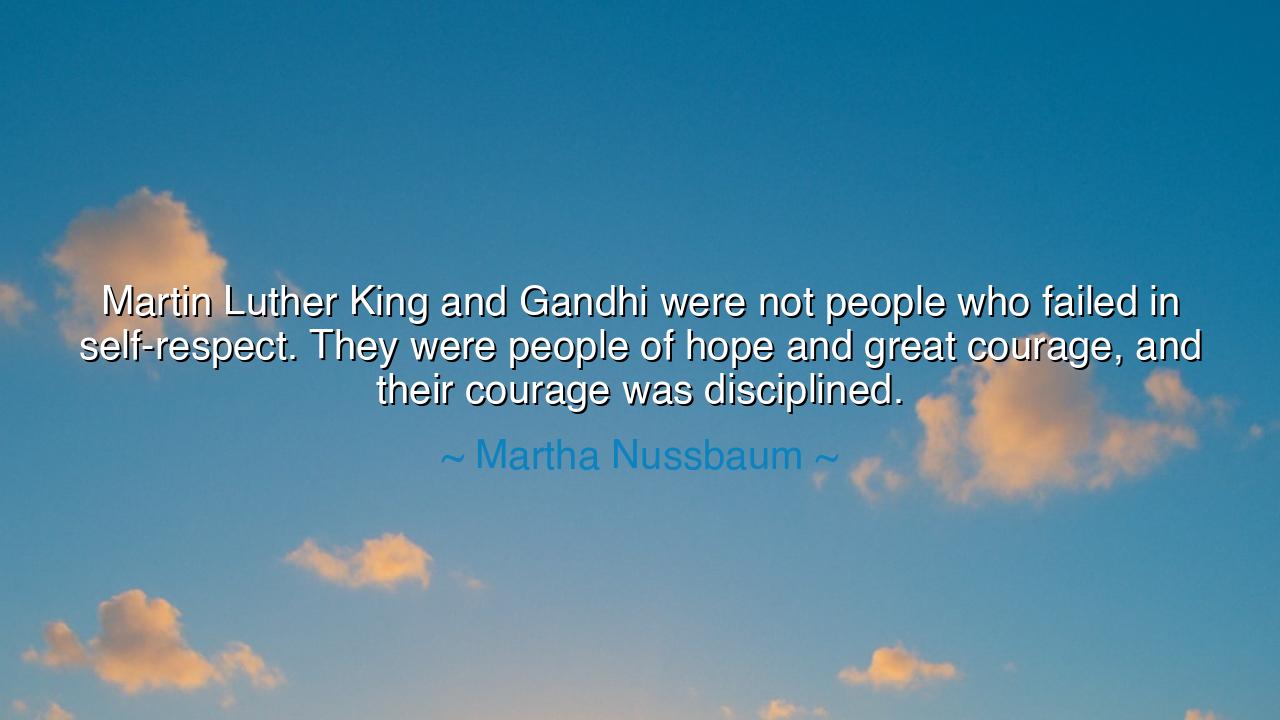
Martin Luther King and Gandhi were not people who failed in
Martin Luther King and Gandhi were not people who failed in self-respect. They were people of hope and great courage, and their courage was disciplined.






Martha Nussbaum, philosopher of compassion and moral strength, once spoke of two of humanity’s brightest lights — “Martin Luther King and Gandhi were not people who failed in self-respect. They were people of hope and great courage, and their courage was disciplined.” In these few lines, she draws a portrait not just of two men, but of a way of living — a path where dignity, hope, and discipline walk hand in hand. For Nussbaum, courage is not the wild flame of rage or defiance; it is the steady lamp that burns through the darkest nights. It is the courage that bows before truth, not before power; that suffers without surrendering its soul.
In the modern world, courage is often misunderstood. Many imagine it as brute strength — the roar of anger, the force of rebellion. But Nussbaum reminds us that true courage is not unbridled aggression; it is disciplined, tempered by reason and guided by conscience. Martin Luther King Jr. and Mahatma Gandhi embodied this higher form of bravery — the courage that endures rather than attacks, that suffers injustice without becoming unjust. Their strength did not arise from pride or hatred, but from an unshakable sense of self-respect — a belief that every human soul, even the oppressor’s, holds a spark of divine worth.
To understand their courage, one must remember the fires they walked through. Gandhi, standing before the might of the British Empire, chose not the sword but the word, not violence but nonviolence. His was a courage born of discipline — to restrain the hand when the heart burned with anger, to forgive when revenge would have been easier. Martin Luther King Jr., inspired by that same spirit, faced mobs, prisons, and threats of death with calm and faith. When struck, he did not strike back; when cursed, he blessed. This was not weakness. It was mastery — the victory of the spirit over the instincts of fear. Their self-respect was not arrogance but humility, not pride but peace.
Such courage demands immense inner discipline. It is easy to hate one’s enemies; it is far harder to love them. It is easy to fight back; it is divine to stand firm without violence. Gandhi and King understood that uncontrolled anger only deepens the cycle of oppression. To break it, they needed to train the soul as one trains the body — to make peace not a sentiment, but a skill. This is what Nussbaum means by “disciplined courage.” It is courage that listens before it speaks, that acts from principle rather than impulse, that holds steady when the storm demands retaliation.
This kind of strength can be seen in other great lives as well. Nelson Mandela, after twenty-seven years in prison, emerged without bitterness, ready to build a nation on forgiveness. The world marveled at his serenity, but it was no miracle — it was discipline. Every day in his cell, he chose to master his heart, to rise above hate. Like Gandhi and King, Mandela understood that freedom without compassion is hollow, and courage without restraint becomes tyranny. The truly brave are those who can wield their power without losing their humanity.
In her reflection, Nussbaum teaches us that self-respect is the root from which disciplined courage grows. To respect oneself is to refuse to be ruled by vengeance or despair. It is to say, “I will not become what I resist.” Both Gandhi and King possessed this unbreakable self-respect — they knew who they were, and therefore no insult, no chain, no bullet could rob them of their dignity. Their hope was not naive; it was forged in suffering, strengthened by patience, and lifted by faith in the better nature of mankind.
So, my child of thought and spirit, take this teaching as your guide: let your courage be disciplined, and your discipline be rooted in love. Do not mistake fury for strength, nor silence for weakness. The world will test you — it will demand that you fight fire with fire — but remember the wisdom of Nussbaum’s words. The greatest warriors are those who master themselves. When you face injustice, stand firm, but do not lose your compassion. When the world grows dark, do not let hatred be your torch — let hope be your light. For in the end, as Gandhi, King, and every soul of peace have shown, it is not violence that changes the world, but disciplined courage guided by self-respect and love.






AAdministratorAdministrator
Welcome, honored guests. Please leave a comment, we will respond soon